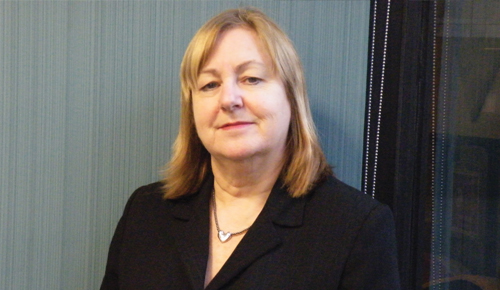Alison Strode, the Welsh government’s therapy adviser, talks to Gill Hitchcock about what ‘prudent healthcare’, informatics and seven-day working mean for physios.

Physiotherapy services across Wales face a rising tide of demand, freedom of information requests by the CSP reveal. At Hywel Dda health board, for example, the CSP found that physios working in intermediate care saw a 40 per cent increase in demand for their services in 2013-14. Meanwhile, for the health board’s musculoskeletal physios the increase was 15 per cent.
Combine this with ebbing budgets for physiotherapy across most health boards, and the government’s prudent healthcare agenda appears to be extremely timely, as well as a challenge for Wales’ therapy adviser Alison Strode.
The essence of prudent healthcare, announced by health minister Mark Drakeford last year, is to halt over-treatment and treatment that is unlikely to benefit patients.
This might sound like stating the obvious, but estimates published by Public Health Wales indicate that 10 per cent of all healthcare interventions are associated with harm, and 20 per cent have no effect on outcomes. While the effects of unnecessary treatments on budgets remain unreported, they are likely to be significant.
Evidence-based treatment, ‘co-production’ or choosing the best care through a dialogue with the patient, together with encouraging self-management, are also part of the prudent approach.
So what does the agenda mean for physiotherapy staff? Ms Strode believes physios will have to look for opportunities to deliver prudent healthcare. ‘I guess the thinking is that professional staff should be looking to work at the top end of their competencies and licences,’ she says.
‘Probably, what we haven’t done with physiotherapy is really get to the detail of that – as with all these things, it’s never straightforward. But I do think there are opportunities to look at what are the competencies physiotherapists have, and actually how can they be better used to deliver prudent healthcare.’
Alive and kicking
Ms Strode has a leading role on the Welsh therapies advisory committee. Last year it received a report written jointly by the CSP and the Welsh physiotherapy leaders’ advisory group. The document indicates that prudent healthcare is already alive and kicking in many health boards.
Among the case studies in the report are Cardiff and Vale’s physiotherapy-led community knee clinics. The service gives patients with osteoarthritis, patella-femoral pain, soft tissue injuries and other problems access to early rehabilitation and self-management programmes, according to the document.
Last summer, money to train advanced physios was announced as part of a £3.5 million Welsh government fund to develop primary healthcare. Ms Strode says she wants to encourage physios to work with their managers to put forward ideas to use this opportunity.
Does the initiative indicate a lack of advanced physios? ‘Well, I think as current services are delivered, it is certainly not my understanding,’ says Ms Strode.
But as services develop with the needs of the population, what we look to do is work with our directors of therapies and health science to plan the workforce so health boards are delivering what’s required.’
For years the Welsh government’s Informing healthcare informatics programme, which started in 2003, put its now-defunct English counterpart, the NHS National Programme for IT (NPfIT), in the shade.
While much of NPfIT, with its big bang approach, hit the buffers, Informing healthcare incrementally implemented individual health records. Its legacy is that 84 per cent of GP records are now available in GP out-of-hours services; two-thirds of GP practices offer online booking; and more than half of hospital referrals are sent electronically.
Informatics refresh
In spring 2014 the Welsh government set out its intention to build on this, by setting up a new health informatics board and refreshing its e-health policies. Exploiting informatics to improve access to services, including using video-conferencing to allow patients and healthcare professionals to talk to each other, and to monitor conditions remotely are key aims.
Ms Strode believes it is extremely important for physiotherapists to be involved in these developments: ‘We are actually doing a lot of work around informatics to support that.
‘And we have a number of strands of work. One is to develop a dashboard to show how quality is being delivered across AHPs [allied health professions].’
Another project aims to standardise therapy records. ‘AHPs are collecting information, but in different formats. So we are trying to align all that across multidisciplinary teams, and across health and social care,’ she says. The driver for the project is evidence-based treatment, a tenet of prudent healthcare.
A £9.5 million technology and telehealth fund, announced by the government last April, could provide a boost for health services in rural areas. The money includes nearly £3 million for remote devices and connectivity to link clinicians with patients, something Ms Strode welcomes as a useful development for physios.
Another improvement Ms Strode would like to see is the extension of self-referral.
She says this high on the agenda for directors of therapies and health science.
‘The other thing it‘s important to say is around seven-day services, because that is a key improvement for the NHS in Wales,’ she says.
Her therapies advisory committee has published two reports on seven-day services, identifying best practice models and setting out issues for NHS organisations.
The documents point to benefits, including fewer readmissions and flexible working for staff. But they also call for financial analysis, evaluation of outcomes and support to prevent staff isolation.
As for the relationship with the CSP, Ms Strode is positive: ‘We have a very good relationship.
‘The policy officer in Wales works incredibly hard with the various groups to make sure that physiotherapy has a high profile and that we all work towards being patient centred.’ fl
Welsh therapies advisory committee see here and search for ‘Welsh therapies advisory’
Author
Gill HitchcockNumber of subscribers: 0




































